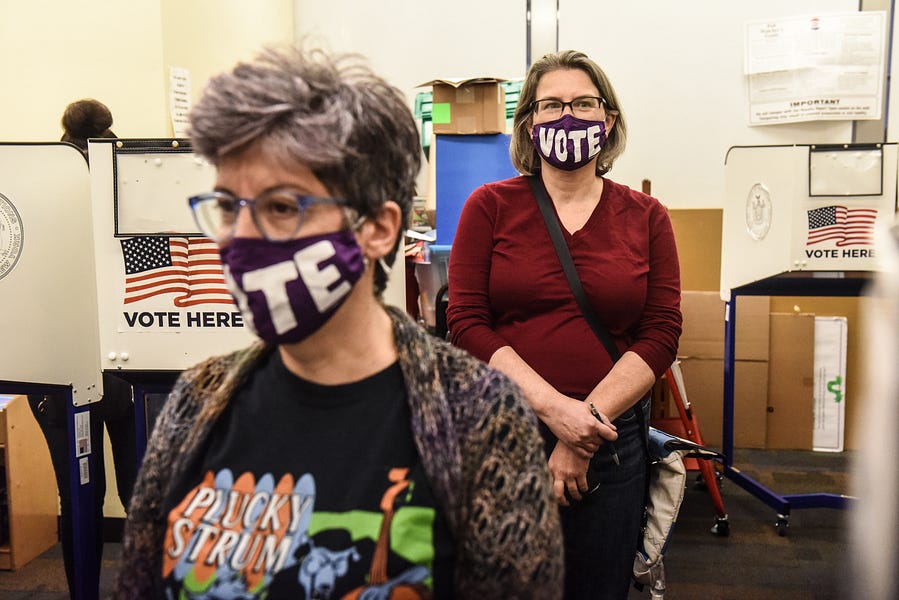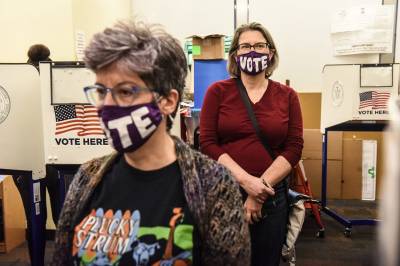Happy Wednesday! Congratulations to the Dodgers—and Clayton Kershaw in particular—for finally getting over the hump and winning the World Series. You have to feel good for Los Angeles; it’s been two full weeks since the city had a championship to celebrate.
Quick Hits: Today’s Top Stories
A study led by Imperial College London found that the number of people testing positive for coronavirus antibodies in the U.K.’s population dropped 26 percent between June and September, indicating that for some, immunity may not be long lasting. Older people and those who reported mild or asymptomatic illness saw the greatest decline in positive tests, although the authors of the study cautioned that the precise role of antibodies in coronavirus immunity is still unclear.
The Daily Caller reports that Hunter Biden and some of his business partners referenced Joe Biden’s friendly relationship with Colombian president Juan Manuel Santos in a May 2017 business proposal to CEFC China Energy. Tony Bobulinski—Hunter’s former business partner, who turned over the business proposal and other documents to the GOP-led Senate committee investigating Hunter—said he met with Joe Biden about the CEFC deal in May 2017, four months after the former vice president left office. Joe Biden has denied having any business involvement with his family.
The National Guard were deployed to Philadelphia after clashes between police and protesters—and looting—exploded on Monday night. The unrest was sparked by the police shooting of Walter Wallace Jr., a 27-year-old Black man who did not comply with orders from police to drop a knife he was holding. Wallace’s family said he struggled with mental health issues. The ensuing unrest resulted in 30 injuries to police officers from bricks, rocks, and, in one case, being struck by a pickup truck.
A Washington Post analysis found that the U.S. government has paid at least $2.5 million in taxpayer money to Donald Trump’s company since he took office. “Since 2017, Trump’s company has charged taxpayers for hotel rooms, ballrooms, cottages, rental houses, golf carts, votive candles, floating candles, candelabras, furniture moving, resort fees, decorative palm trees, strip steak, chocolate cake, breakfast buffets, $88 bottles of wine and $1,000 worth of liquor for White House aides. And water.”
Parts of Mississippi and Louisiana—including metropolitan New Orleans—are under hurricane warnings as the National Hurricane Center said that Tropical Storm Zeta is expected to make U.S. landfall today as a Category 1 hurricane.
The National Institute of Allergy and Infectious Diseases halted a study evaluating pharmaceutical manufacturer Eli Lilly’s monoclonal antibody treatment for patients hospitalized with coronavirus after results indicated the drug did not help them. Eli Lilly said in a statement that it still believed its drug could help patients earlier in the course of the disease, and that other trials were still ongoing.
President Trump issued an executive order last week that would allow federal agencies to reclassify some workers and make it easier to fire them. “Agencies need the flexibility to expeditiously remove poorly performing employees from these positions without facing extensive delays or litigation,” the White House said in a press release.
The United States confirmed 74,797 new cases of COVID-19 yesterday per the Johns Hopkins University COVID-19 Dashboard, with 7.1 percent of the 1,052,874 tests reported coming back positive. An additional 924 deaths were attributed to the virus on Tuesday, bringing the pandemic’s American death toll to 226,613. According to the COVID Tracking Project, 44,212 Americans are currently hospitalized with COVID-19.


A Labyrinth of Lawsuits
With the election in just six days now, one of the biggest remaining questions concerns how the vote is tabulated—and millions of dollars have been poured into litigation efforts across the country in recent months to shape the answer. From statewide ballot counting extensions, to universal mail-in-voting orders, to ballot harvesting prohibitions, among other issues, there are literally hundreds of election-related lawsuits at stake this year. If races—presidential or down ballot—are blowouts one way or another, these fights will be relatively inconsequential. But if they are close, the squabbles could matter a lot. Here’s an overview of some of the most pertinent rulings.
Texas: In what is expected to be the final ruling on the matter before Election Day, the Texas Supreme Court on Tuesday let stand Republican Gov. Greg Abbott’s October 1 order limiting counties to one mail ballot collection box. “The Governor’s October Proclamation provides Texas voters more ways to vote in the November 3 election than does the Election Code. It does not disenfranchise anyone,” the all-Republican court held. The Texas Supreme Court’s ruling means that even highly populated municipalities like Harris County are permitted only one drop-off site.
Texas is one of only a few states this year not allowing no-excuse absentee voting; only voters who are sick/disabled, 65-years-old and up, out of the county during the voting period, or in prison are allowed to vote absentee. As a result, a smaller percentage of voters require a ballot collection box. But in-person early voting in the state began October 13, and turnout is through the roof. According to the U.S. Elections Project, voters in Texas have already cast 87 percent as many votes as were counted in that state in 2016.
Wisconsin: In a 5-3 decision on Monday, the U.S. Supreme Court’s conservative majority held that ballots in Wisconsin must be received by 8:00 p.m. on Nov. 3 in order to be counted. The court’s ruling rejected an appeal by Democratic groups who had originally requested that the state accept mail-in ballots up to six days after Election Day, provided they were postmarked by Nov. 3. Wisconsin Democrats are now urging voters to turn in mail ballots to drop off sites and election clerk offices, fearing that the U.S. Postal Service will not be able to deliver ballots before the polls close on Election Day. (Michigan Secretary of State Jocelyn Benson made a similar pronouncement yesterday as well.)
North Carolina: President Trump’s campaign asked the U.S. Supreme Court again on Sunday to prohibit the North Carolina State Board of Elections from counting ballots up to seven days after Election Day provided they were postmarked by Nov. 3, citing voter fraud concerns. The GOP’s latest move came three days after the 4th U.S. Circuit Court of Appeals upheld the ballot counting extension.
“An emergency injunction is urgently needed to ensure that our federal election is governed by the statutes enacted by the people’s duly elected representatives, and not by the whims of an unelected state agency,” the Trump campaign wrote in a Sunday filing to the Supreme Court.
Pennsylvania: On Friday, the Pennsylvania Supreme Court unanimously ruled that election officials cannot invalidate ballots over mismatched signatures, upholding the mail-in ballot guidance that Pennsylvania’s Democratic Secretary of State Kathy Boockvar issued in September.
The ruling follows a 4-4 U.S. Supreme Court decision on October 19 that maintained a lower court’s ruling: Mail-in ballots can be received up to three days after Election Day, even if the ballot’s postmark is illegible or cannot be found. The state’s Republican Party is pushing for the high court to decide the case now that Justice Amy Coney Barrett has been seated.
New Jersey: A federal judge on Thursday threw out the Trump campaign’s lawsuit alleging that New Jersey’s mostly vote-by-mail election would be riddled with fraud. The Trump campaign’s lawsuit claimed that New Jersey’s “long history of issues with voting by mail” means that voter fraud is “destined,” “guaranteed,” or “otherwise inevitable.” But U.S. District Court Judge Michael Shipp argued that most of the plaintiffs’ arguments were speculative at best. “Plaintiffs have alleged nothing more than the possibility of future injury to their members,” Shipp wrote in his ruling.
Alabama: In a 5-3 ruling last Wednesday, the U.S. Supreme Court’s conservative majority struck down an Alabama federal district judge’s ruling which would have permitted (but not required) curbside voting throughout the state. “The plaintiffs have shown that the curbside voting ban imposes a significant burden on vulnerable voters during the Covid-19 pandemic,” Abdul K. Kallon of the Federal District Court in Birmingham wrote in response to Alabama Secretary of State John Merrill’s prohibition of the practice. Kallon’s decision was upheld by the 11th Circuit Court of Appeals before it was struck down by the Supreme Court.
“It does not require all counties to adopt curbside voting; it simply gives prepared counties the option to do so,” Justice Sotomayor wrote in a dissent joined by Justices Stephen Breyer and Elena Kagan. “This remedy respects both the right of voters with disabilities to vote safely and the state’s interest in orderly elections.”
Maine: The Supreme Judicial Court of Maine let stand a lower court judge’s September decision that Maine’s election rules do not endanger the health of seniors seeking to vote during the coronavirus pandemic. The Alliance for Retired Americans filed a lawsuit in June urging the state to subsidize mail-in ballot postage and count ballots postmarked by or before Nov. 3, among other measures, which was rejected by the state’s highest court.
Georgia: On October 13, a federal judge in Georgia dismissed a lawsuit brought by Democratic-leaning groups alleging that state election officials are disenfranchising voters with long wait lines caused by a shortage in poll staffers and polling locations, among other things.
“The predictive value of Georgia’s past elections is simply too limited to tell us (with the requisite certainty) what will happen in November,” District Judge Michael Brown wrote in his 78 page ruling. He rejected the plaintiffs’ claim that long lines were “all but certain” to occur. “Georgia revamped its voting equipment and voting process in 2020, so elections before reveal little about elections today.”
Ohio: On October 8, U.S. District Judge Dan Polster temporarily blocked Ohio Secretary of State Frank LaRose’s directive limiting mail-in ballot drop-off sites to a single location in each county throughout the state. Polster is the second federal judge in recent weeks to oppose LaRose’s one-box-per-county order.
Montana: U.S. District Judge Dana Christensen upheld Democratic Governor Steve Bullock’s executive order permitting counties in Montana to hold elections by mail. Christensen’s October 7 ruling denied the Trump campaign any form of injunctive or declaratory relief, and also held that the “plaintiffs were compelled to concede that they cannot point to a single instance of voter fraud in Montana in any election during the last 20 years.”
South Carolina: The Supreme Court sided with Republicans in an October 5 ruling that reinstated a ballot witness requirement in South Carolina. Pending future litigation, South Carolina voters are now required to include a witness signature on their absentee ballots, in keeping with a law that has been on the books since 1953.
Iowa: On October 5, a Fifth District judge sided with state Democrats and temporarily blocked Iowa Secretary of State Paul Pate’s directive ordering county auditors to mail only blank—rather than pre-filled—ballot request forms to Iowan voters ahead of the election. Republicans argue that sending pre-filled absentee ballot requests jeopardizes election security.
Arizona: On October 2, the Supreme Court agreed to hear an appeal from state Republicans challenging a Ninth Circuit panel’s ruling that two of the state’s election laws are in violation of the 1965 Voting Rights Act. The San Francisco-based Ninth Circuit court, which made the ruling in January, will let the laws stand through November while the case is pending appeal. The Arizona laws at stake in this case currently prohibit third parties from delivering a voter’s early ballot and invalidate any ballot cast in precincts where the voter is not assigned.
New Hampshire: Also on October 2, a Hillsborough County judge in New Hampshire sided with the Trump campaign and dismissed most of the arguments levied by the American Federation of Teachers in their lawsuit challenging the state’s voting procedures. The teacher’s union had argued that the state should extend its mail-in-voting deadline, allow third-party individuals to deliver ballots on a voter’s behalf, and subsidize mail-in-voting stamps—but the judge ruled that the union failed to show how failing to implement these measures would burden voters.
Minnesota: Two Minnesota Republicans are challenging Democratic Secretary of State Steve Simon’s directive permitting state election officials to count mail-in ballots that arrive seven days after Election Day.
If you plan to vote absentee and haven’t yet sent in your ballot, Buzzfeed News created a helpful guide clarifying when mail-in ballots must be postmarked in every state.
Worth Your Time
After a year on the road chatting with critical voters in battleground states, Politico’s chief political correspondent Tim Alberta shares his final predictions for Election Day 2020. “All of us are held hostage by memories of four Novembers ago,” he writes. “The bad news for Trump supporters: 2020 is nothing like 2016.” In a sixteen point rundown, Alberta distinguishes the Trump-Biden race from the Trump-Clinton one. “Four years ago, Trump defeated a Democratic opponent who was intensely disliked by tens of millions of voters; who was viewed as untrustworthy by huge majorities of the public,” Alberta writes. “Today, Trump is facing a Democratic opponent who does not polarize the country, who does not antagonize the right, and who is personally well-liked.”
A few weeks back, National Review ran a series of pieces making the case for and against voting for Trump this year. Andrew McCarthy said yes, Charlie Cooke said maybe, and Ramesh Ponnuru said no. All are worth your time. Yesterday, Kevin Williamson added his own entry: “Hell, no.” Williamson calls out the “lie” that conservative objection to Trump “is only a matter of style, his boorishness bumptiousness and boobishness on Twitter, his gooftastical manner of speaking, his preening, his vanity, his habitual and often dishonest boasting in matters both small and great.” Rather, “Trump’s low character is not only an abstract ethical concern but a public menace that has introduced elements of chaos and unpredictability in U.S. government activity ranging from national defense to managing the coronavirus epidemic. ... His vanity and paranoia have made it very difficult for him to keep good people in top positions, and this imposes real costs both politically and as a matter of practical governance. Trump’s problem is not etiquette: It is dishonesty, stupidity, and incompetence, magnified by the self-dealing and cowardice of the cabal of enablers and sycophants who have a stake in pretending that this unsalted s*** sandwich is filet mignon.”
“Republican lawmakers and officials now reflexively tout their proximity to Trump — like the ‘100 percent Trump voting record’ that Senator Kelly Loeffler of Georgia claims in a recent ad,” writes Elaina Plott. “They reference ‘Trumpism’ casually and constantly and accede that it will in some way dictate the future of the party. But they can’t seem to agree on what it actually is.” Plott’s piece—a New York Times magazine cover story—makes the case that, whether Trump wins or loses next week, the Republican Party has been remade in his image, and that isn’t changing anytime soon. “What Trump understood,” Republican consultant Jeff Roe—who ran Ted Cruz’s 2016 presidential campaign—told Plott, “is that Republican voters have become more polarized but less ideological. A great number of them cared about some of the issues, but they didn’t want esoteric debates on trade policy, or, frankly, deficits or things like that either. They just wanted a politician to be on their side.”
Presented Without Comment
Also Presented Without Comment
Toeing the Company Line
Over at the site today, Andrew has a deep dive into an issue you’re likely to start hearing more about as a COVID vaccine draws nearer: Whether there’s a risk the vaccine will be rejected as unethical by pro-life people who oppose medical research that relies on fetal-derived tissue.
In this week’s Capitolism newsletter (🔒), Scott Lincicome takes a look at Joe Biden’s proposed tax policy—although as he notes, campaign proposals are more a reflection of what candidates think voters want to hear than anything else. After examining the various analyses of Biden’s tax plan, Scott concludes that it would have a neutral-to-slightly-negative effect on growth, and make the tax code more complex. Given “the massive recent increase in U.S. debt due to COVID-19 fiscal policy, the current economic situation in the United States, and the aforementioned complexity, competitiveness, and growth concerns that the Biden tax plan raises,” Scott concludes it is “precisely the wrong policy for the United States to pursue right now.”
Fox News’ Chris Stirewalt joins Jonah on the latest episode of TheRemnant, and cuts through the late-in-the-race noise to discuss the plausibility of various election outcomes. Will Biden blow Trump out? Will it be a close race? Will “shy Trump voters” strike again?
Let Us Know
Depending on how the race shakes out, there’s a chance we may not be able to project the victor of the presidential race on Election Night itself. (If Biden wins Florida or North Carolina, we almost assuredly will be able to.)
What’s your plan for next Tuesday? Are you going to stay up and watch the returns? Join the Dispatch Live conversation that evening? (Details to come!) Or go to bed and trust that we’ll let you know what happened in the morning?
Reporting by Declan Garvey (@declanpgarvey), Andrew Egger (@EggerDC), Audrey Fahlberg (@FahlOutBerg), Charlotte Lawson (@charlotteUVA), James P. Sutton (@jamespsuttonsf), and Steve Hayes (@stephenfhayes).
Photo by Stephanie Keith/Getty Images.







Please note that we at The Dispatch hold ourselves, our work, and our commenters to a higher standard than other places on the internet. We welcome comments that foster genuine debate or discussion—including comments critical of us or our work—but responses that include ad hominem attacks on fellow Dispatch members or are intended to stoke fear and anger may be moderated.
With your membership, you only have the ability to comment on The Morning Dispatch articles. Consider upgrading to join the conversation everywhere.